Round Table on ‘Humanitarian Cooperation on the Gaza Crisis’
At the ‘First Round Table on the Humanitarian Cooperation on the Gaza Crisis’ organized by the Global Peace Summit (GPS), a diverse group of international and local experts, former ambassadors, defense analysts, and diplomats reached a consensus on the urgent need for a ceasefire in Gaza and called on Israel to end its aggression against Palestinian civilians.
Chairman of the GPS, Shaikh Mahmud bin Ilyas opened the discussion and welcomed the guests that included key figures such as DrYousef Al-Akkad, General Manager of the European Gaza Hospital, and Harry Sholy from the Palestine Red Crescent Society (PRCS). They shared firsthand accounts of the humanitarian disaster in Gaza, particularly focusing on the medical crisis and the devastation of healthcare facilities and the challenges being faced on ground.
Dr. Fouzi described how hospitals in Gaza are unable to operate effectively, with medical staff, equipment, and relief supplies being denied access by Israeli forces. Thousands of trucks carrying vital aid are stuck at the Rafah and Al-Arish border crossings, exacerbating the situation. He stressed that immediate international assistance is needed to address the healthcare collapse and the wider humanitarian catastrophe.
The first round (virtual) was moderated by Canadian journalist Robert Fantina. Alexander Lawson, Associate Professor of Law at Ziauddin University noted Israel’s assault on Gaza was entering its second year. He discussed South Africa’s legal case on genocide in the International Court of Justice (ICJ) and the potential for further international action against Israel under the Genocide Convention.

Asham Agha Nadeem, Head of Communications for Denmark’s Independent Greens Party, noted a growing sympathy for Palestinians among European citizens, despite the official stance of some governments. Palestinian American author IbtisamBarakat drew attention to the plight of children in Gaza, who have been out of school for nearly a year due to the destruction of educational infrastructure. She urged international support for online education to mitigate the long-term psychological trauma faced by these children.
Ramsey Hanhan, a Palestinian American author, lamented how Gaza, once a hub of agricultural exports, has seen its economy decimated by the Israeli attacks on its farms and orchards. Similarly, LaillaBal Mahdi from the UK said there was ample of genocide in Gaza, citing a sharp rise in the death toll from 40,000 in June 2024 to around 250,000. She called for an immediate ceasefire to halt the escalating violence.
Co-Founder of GPS, ShozabMajeed, an International law expert, led the second round of moderation with the Pakistani panelists who underscored the international community’s responsibility to push for a ceasefire. Former Ambassadors Dr. Raza Muhammad, President of Islamabad Policy Research Institute (IPRI) and Syed AbrarHussain, Vice President of Institute of Policy Studies (IPS), questioned why Western powers were not intervening more forcefully, suggesting that the ongoing U.S. election cycle may be a factor in delaying action against Israel. Both expressed concerns that Israeli Prime Minister Benjamin Netanyahu might exploit the political vacuum to expand the conflict and stressed on focusing on humanitarian zzzzzzzzz OGDCL-IPRI Chair of Economic Security Dr. Aneel Salman warned of the Gaza crisis’ impact on global markets, particularly the volatility of oil prices, which could trigger economic instability across the region. Brigadier (R) Said Nazir raised alarms about the possibility of Israel using more advanced and lethal weaponry, while Maj. Gen. (R) ZahidMehmood stressed the protracted nature of the conflict and the risk of it spreading to neighboring countries if left unchecked.
Political Officer at the Embassy of Egypt, Hager Abdellatif, also attended the conference. MahamNaweed analyzed Israel’s actions in Gaza through the lens of international law. Former Amb Ali SarwarNaqvi, Executive Director for the Center for International Strategic Studies (CISS), spoke about the historical challenges of transnational efforts from the League of Nations to the present day as the UN was handicapped. He called for the unified efforts of peace-loving states that needed to come together to give a clear message to Israel for a ceasefire by signing a resolution.
Co-Founder of GPS Syed Muaz Shah concluded the session. Although there was potential for the conflict to expand, yet the recent diplomatic efforts including Palestinian political factions unifying with Chinese assistance and Saudi Arabia’s recent push in the UN General Assembly for a two-state solution gained support from over 100 countries. He confirmed that GPS would continue future discussions on Gaza.
The round table ended with a commitment to compile recommendations to be presented to governments and decision-makers, aimed at influencing policy to bring peace and stability to the region and extending support to the victims as per their own capacity.









